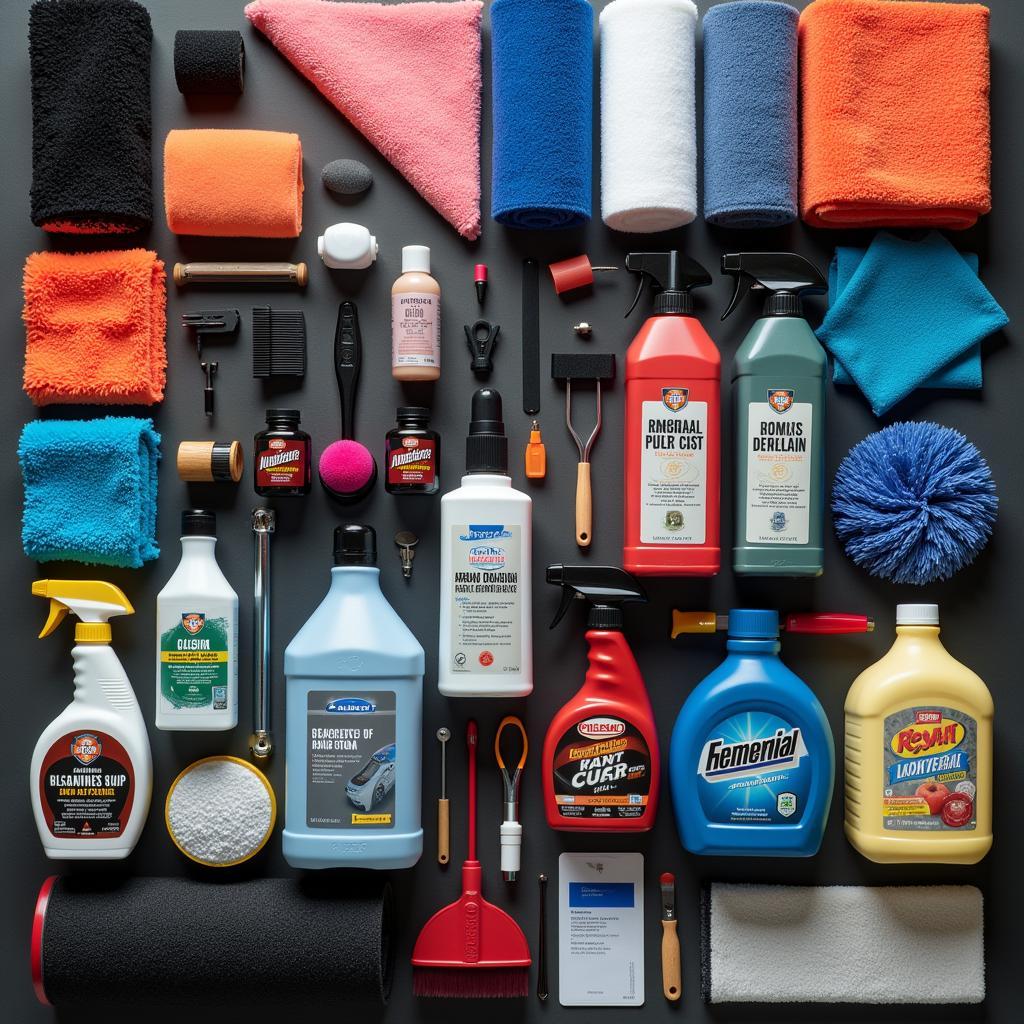So, you’re looking at your car and thinking it needs a little…TLC. Maybe it’s lost its shine, or perhaps bird droppings and road grime are taking their toll. You’re wondering, “Can I Detail The Exterior Of My Own Car?” Absolutely! Not only is it possible, but it can also be quite satisfying (and save you some money). Let’s dive into everything you need to know to detail your car like a pro.
DIY Car Detailing: What Does it Involve?
Detailing goes beyond a simple car wash. It’s about restoring your car’s paintwork to its former glory and protecting it from the elements. Here’s a breakdown:
- Washing: This isn’t your typical drive-through wash. Detailing starts with a thorough hand wash using the right car wash soap and techniques to remove loose dirt and grime.
- Decontamination: This step removes embedded contaminants like iron particles and tree sap that washing alone can’t tackle.
- Clay Bar Treatment: Using a clay bar glides across the paint surface, picking up any remaining tiny particles and leaving a smooth finish.
- Polishing: This is where the magic happens. Polishing uses specialized machines and compounds to remove minor scratches, swirl marks, and oxidation, bringing back the paint’s shine.
- Protection: After all that work, you’ll want to protect your car’s paint. This involves applying a sealant or wax to create a barrier against UV rays, water spots, and other environmental hazards.
 Car detailing supplies laid out on a table.
Car detailing supplies laid out on a table.
The Perks of Detailing Your Own Car
- Pride of Ownership: There’s a unique satisfaction that comes from transforming your own car.
- Cost Savings: Professional detailing can be pricey, but doing it yourself saves money in the long run.
- Control Over Quality: You choose the products and methods, ensuring your car is treated with care.
- Therapeutic: Many find car detailing to be a relaxing and rewarding hobby.
The Challenges to Consider
- Time Commitment: Detailing is not a quick task; it requires a significant time investment, especially if it’s your first time.
- Learning Curve: Achieving professional-level results requires understanding proper techniques and product knowledge.
- Equipment Costs: While cheaper than multiple professional details, the initial investment in tools and products can add up.
- Physical Demands: Detailing can be physically demanding, involving a lot of scrubbing, polishing, and working in various positions.
Essential Tools for DIY Exterior Detailing
- Two Buckets with Grit Guards: One for soapy water and one for rinsing, preventing cross-contamination of dirt.
- Wash Mitts and Microfiber Towels: Soft materials to avoid scratching the paint.
- Car Wash Soap: Specifically formulated to be gentle on car paint.
- Decontamination Spray: To loosen embedded contaminants.
- Clay Bar and Lubricant: For a smooth-as-glass finish.
- Polishing Machine (Optional): Speeds up the polishing process but requires careful handling.
- Polishing and Cutting Compounds: Choose based on your paint’s condition.
- Wax or Sealant: For long-lasting paint protection.
- Applicator Pads: For applying polishes, waxes, and sealants.
How Much to Tip a Car Detailer?
For those who prefer to leave it to the professionals, understanding tipping etiquette is important. Check out our detailed guide on how much to tip a car detailer for insights and recommendations: how much to ti car detailer.
Can Detailing Remove Scratches?
Detailing can significantly improve the appearance of scratches, and in some cases, minor scratches can be removed entirely. Learn more about the limits and possibilities of scratch removal through detailing in our comprehensive article: does detailing car remove scratches.
Conclusion
Deciding whether to detail your car yourself is a personal choice. If you enjoy DIY projects, have the time, and are willing to learn, it can be a fulfilling experience. However, if you’re short on time or prefer professional-level results from the start, seeking out a reputable detailer might be the better option. No matter your choice, a well-maintained exterior not only makes your car look fantastic but also helps protect your investment in the long run.

Leave a Reply